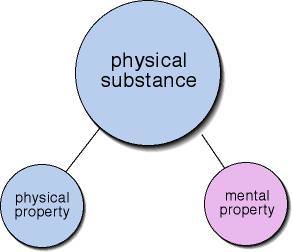4.2 物质二元主义和存在主义
章节大纲
-
Substance Dualism
::物质二元主义In this tradition of dualism both matter and spirit exist and are separate substances: one physical and extended in time and space and the other not so extended.
::在这种二元主义传统中,物质和精神都存在,是独立的物质:一种物质在时间和空间上是物理物质,一种在时间和空间上是延伸的,另一种没有延伸的。There are some dualists who claim that there is one reality which is composed of two different substances: physical and spiritual. These two substances are quite different form one another. There are some dualists who claim that there is one reality that has two aspects to every real thing: the physical and mental.
::有些二元论者声称,存在一种由两种不同物质组成的现实:物理和精神。这两种物质是截然不同的。 有一些二元论者声称,存在一种现实,每个真实事物有两个方面:身体和精神。Plato and Dualism
::排和二元主义Plato thought that the soul could and would exist apart from the body and would exist after the death of the body. He offered a "proof" for this position and was the first to do so in writing that we have any evidence of doing so. He offered several different proofs or arguments none of which are convincing today. They are held to be specious arguments or terribly flawed and unconvincing. He held that humans were composed of bodies and souls but the soul was more important and immortal. His arguments used premises which we question today. For example, Plato thought that he could conclude that the soul could exist independent of the body because it acted independently from the body when it engaged in pure thought. This is no longer accepted as true since it is equally evident today that without a physical brain thought appears unlikely to occur. Plato thought that the only way to explain how people come to know things is that they are remembering the knowledge implanted in their souls when the souls were in the realm of pure thought and eternal forms before entering into the body after which they forgot as they became confused by physical emotions and feelings and limited experiences through the senses. This is no longer accepted as the best explanation of how people come to have knowledge. None the less, Plato is credited with being the first human to attempt to set out any sort of a proof that humans had souls and that they survived the death of the body and that they were immortal. He offered these arguments in the dialogue he wrote titled the Phaedo .
::柏拉图认为,灵魂可以存在,也可以存在于身体之外,并且会存在于身体死亡之后。他为这个姿势提供了“防身”的“防身”,他是第一个以书面方式这样做的人,我们对此有任何证据。他提供了若干不同的证据或论点,但今天没有令人信服的证据或论点。他们被认为是似是而非的论据,或者存在严重缺陷和不相信。他坚持认为,人类是由身体和灵魂组成的,但灵魂是更加重要和永恒的。他的论点使用了我们今天质疑的前提。例如,柏拉图认为,他可以断定,灵魂可以独立于身体而独立存在,因为在身体进行纯洁思索时,它可以独立行动。这不再被接受为事实,因为今天同样明显的是,没有大脑的思考似乎不太可能发生。柏拉图认为,唯一能够解释事情的方法是,当灵魂处于纯净思想和永恒的形式之后,进入身体时,他们就会提出疑问。例如,他可以认为,灵魂可以独立于身体之外,因为身体,当身体在纯粹思考时,身体上的行为是独立的。这已经不再被接受为事实所接受,因为这样的解释是人类的最好解释。他没有那么努力。他。他写下来,这种解释是最好的解释。这种解释。他没有被写成是最好的。他。他所写下来,没有被写下来的任何是最好的解释。他。作为最好的解释。他。作为最好的解释。他的任何。他。他。Descartes and Dualism
::笛卡尔和二元主义Descartes also believed that the soul existed prior to and separate from the body (see Meditation II , of Meditations on First Philosophy ) and so was immortal. In his view all of reality consisted of two very different substances: matter or the physical and spirit or the non-physical. The physical was what would be extended in time and space and the non-physical would not be so characterized. For Descartes the soul of a human exists prior to and separate from the body. His proof consisted of argumentation that has been seriously criticized and rejected. He thought that if he could in some form demonstrate that humans can prove that they exist without first proving that they have physical bodies then that would prove that they did not need a physical body in order to exist. He thought that his famous claim that " I think therefore I am " established not just that he existed but that he existed without a body as a "thinking thing". A "thinking thing" is a thing that thinks and by that would be included: imagining, conceiving, hoping, dreaming, desiring, fearing, conjecturing, reasoning, remembering and more. For him a "thinking thing" needed no physical parts to do what it does. Modern science has established that there is no evidence of humans that are without a physical body and its brain. There is no evidence that thought is possible without a brain. There is much evidence that what has been associated with Descartes' "thinking thing" is now explained solely in terms of the brain and how the brain is physically structured and the functioning of the brain.
::笛卡尔也相信灵魂存在于身体之前,与身体分离(见《第一哲学的冥想二》,《第一哲学的冥想二》),因此是永恒的。在他看来,所有现实都由两种非常不同的物质组成:物质或身体和精神,或非物理物质。物理是时间和空间的延伸,而非物理的特征并非如此。对于将人类灵魂存在于身体之前和与身体分离的情况,他的证据包括严重批评和拒绝的争论。他认为,如果他能够以某种形式证明人类的存在,而不必先证明他们有身体的身体,那么,就会证明他们并不需要身体的身体存在。他认为,“因此我认为我的存在”不仅存在,而且他没有身体的“思考的东西”存在。“思考的东西”是一种思考,想象,想象,希望,梦想,绝望,恐惧,思考,恐惧,想象,思考,思考,思考,思考,思考,思考,思考,然后证明他们的身体身体,记忆和更多的大脑, 大脑的功能是“结构” 而不是大脑的一部分。他认为,大脑的思维是“结构”是没有任何可能,大脑的思考,而大脑的原理是“结构是没有。 大脑的一部分是“结构是没有。”是,大脑的一部分是没有。“思考,大脑的原理是“结构,大脑的一部分是没有。 大脑的。“结构是没有。”是“思考,大脑的一部分是没有。”是“结构,大脑的一部分,大脑的一部分是没有。“结构是没有。”是“结构,大脑的道理是没有。”是没有。Now most people born in the west in the 20th Century have acquired the belief in dualism through their culture. It is part of the belief system of the Judaeo-Christian-Islam traditions. It appears to most people as quite obvious. It carries with it however, several major problems. One of them is the division created between the material realm which includes human bodies and brains and the non-material realm or the spiritual realm which would include minds and souls or spirits. In philosophy of mind dualism would be the general position that minds and bodies are distinct substances and so the mind is not physical and not part of the body.
::现在,20世纪西方出生的大多数人已经通过自己的文化获得了对二元主义的信仰,这是犹太教-基督教-伊斯兰传统信仰体系的一部分,在大多数人看来是显而易见的,但伴随而来的是几个重大问题,其中之一是物质领域(包括人的身体和大脑)和非物质领域(包括思想、灵魂或精神)之间的分裂。在思想二元主义思想中,思想和身体是不同的物质,因此思想不是身体的一部分,也不是身体的一部分。Cartesian Dualism
::笛卡尔两德主义Existentialism
::存在主义Existentialism , a philosophical movement or tendency, emphasizing individual existence, freedom, and choice that influenced many diverse writers in the 19th and 20th centuries
::存在主义、哲学运动或趋势,强调个人的存在、自由和选择,这些在19世纪和20世纪影响到许多不同作家The existentialists separated from the debate between the materialists and the idealists. Instead they focused on what humans could know for certain. We know that we exist and that we are aware of that existence. We are aware that there are things that exist that do not appear to be aware and do not have freedom. So there are those things that have that awareness and those that do not.
::与物质主义者和理想主义者之间的辩论脱节的存在主义者,相反,他们侧重于人类可以肯定地知道的东西。我们知道我们的存在,我们知道我们的存在,我们知道我们的存在。我们知道存在的东西似乎没有意识,没有自由。因此,有的东西具有这种意识,有的没有意识。As the existentialist, Jean-Paul Sartre, categorized real things in two varieties only:
::作为生存主义者Jean-Paul Sartre, 将真实事物分为两种:-
Being-for-itself is conscious and free
::自我为自己是自觉和自由的 -
Being-in-itself is non-conscious.
::在自己身上是没有意识的。
So for the existentialists there are two types of real things, two types of things that exist: being-for-itself and being-in-itself .
::所以对于存在论者来说,有两种真实的东西, 两种存在的东西: 自我和自我。Jean-Paul Sartre Existentialism
::让-保罗·萨特尔There is no proof of souls or spirits or ghosts or deities and thus their existence is nothing other than what people make a decision to believe. People decide whether or not to believe that such entities are real or not and they decide on the criteria for making such decisions. What is given immediately to consciousness is consciousness and through it the awareness of what is not conscious and not free.
::没有灵魂或灵魂、鬼魂或神灵的证据,因此,它们的存在只是人们决定信仰的东西,人们决定相信这些实体是否真实,他们决定作出这种决定的标准,立即赋予意识的是意识,通过意识认识那些没有意识和没有自由的东西。Some existentialists hold that such beliefs are and must be beyond reason so that humans must make a leap of faith into the beliefs of the reality of such nonphysical entities. For certain what humans can know is their own existence and the existence of things not like humans because they have no consciousness and are not free.
::一些存在主义主义者认为,这种信仰是、而且必须是超越理性的,这样人类就必须向这种非物质实体的现实信仰迈出信仰的步伐。 某些人可以知道的是他们自己的存在,以及由于他们没有意识和自由而不像人类的东西的存在。Henri on Existentialism
::亨利关于存在主义EPISD Critical Knowledge and Creative Thinkers Goal
::EPISD 关键知识和创意思想者目标Philosophy Applications
::哲学应用Descartes believed that only humans had souls because, among other things, animals can’t reason the way that we do. Some followers of Descartes took this to mean that animals have no mental states at all, not even pain.
::笛卡尔相信,只有人类才有灵魂,因为除其他外,动物无法解释我们的方式。 笛卡尔的一些追随者认为这意味着动物根本没有精神状态,甚至没有痛苦。1. Does our mental superiority give us the right to use animals as we please? Why or why not?
::1. 我们的精神优越感是否赋予了我们随意使用动物的权利?为什么或为什么不?If mental states are brain states, then by scanning your brain, we should be able to know what you are thinking. Suppose we had a brain scanner that could reliably tell whether someone was lying.
::如果精神状态是大脑状态,那么通过扫描你的大脑,我们应该能够知道你在想什么。 假如我们有一个大脑扫描仪,可以可靠地判断是否有人撒谎的话。2. Should we make everyone wear one of those devices when they take the witness stand? Why or why not?
::2. 我们是否应该让每个人在接受证人作证时都佩戴这些装置之一?为什么或为什么不?Suppose you fell in love with someone who seemed to be the most intelligent, witty, and caring person you’ve ever met. Now suppose that “person” turns out to be an android.
::假设你爱上了一个你见过的最聪明、机智和关怀的人。 现在假设“人”是机器人。3. Would you conclude that he or she doesn’t have a mind/soul? Why or why not?
::3. 你是否认为他/她没有头脑/灵魂?为什么或为什么?4. Would you still love him or her? Why or why not?
::4. 你仍然爱他或她吗?Vocabulary
::词汇表EPISD Effective Bilingual Education Goal
::EPISD 有效双语教育目标 -
Being-for-itself is conscious and free




